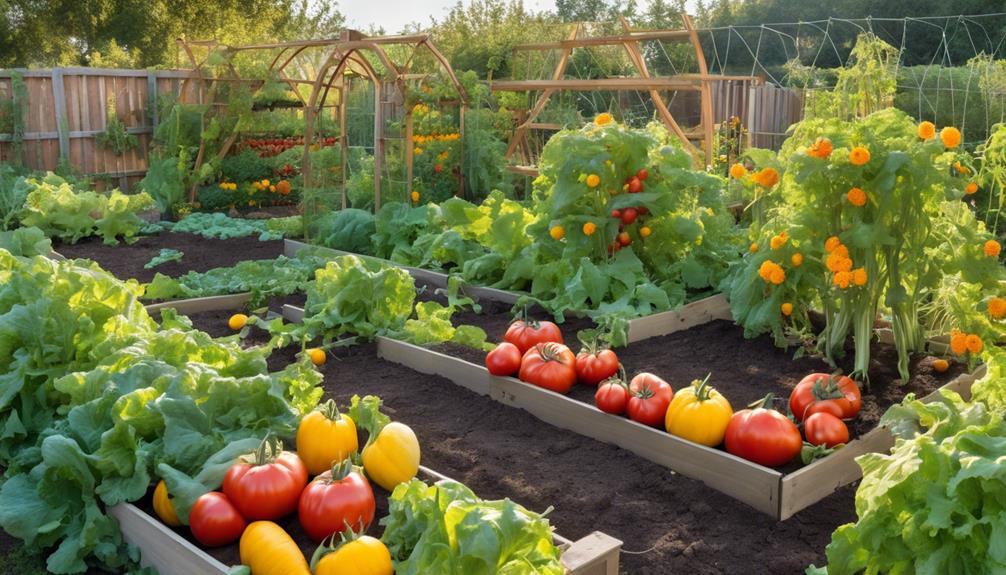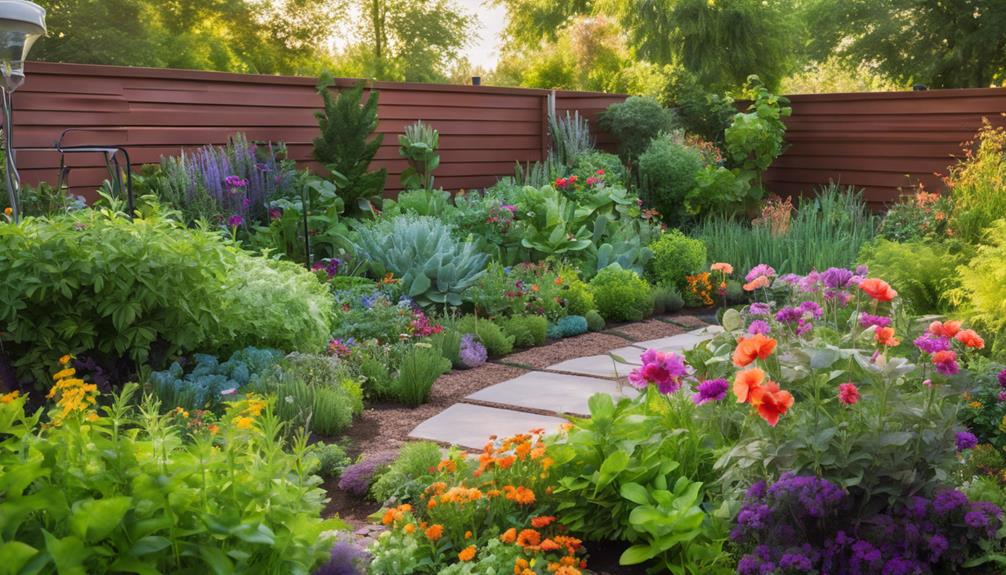
What to Consider When Choosing Garden Maintenance Services?
29 September 2024
7 Best Tips for Choosing Garden Maintenance Services
29 September 2024Selecting a garden maintenance service requires careful consideration.
Begin by evaluating the types of services offered, such as lawn care, pest control, and seasonal maintenance.
Check customer reviews for insights into reliability and quality. An initial consultation is essential to discuss your garden's specific needs and maintenance goals.
Consider the time-saving benefits of hiring professionals to manage your garden. Furthermore, inquire about the technology they use for efficient garden management.
Ensure you fully understand the service agreement details for transparency.
Discover further insights on making the best choice for your garden care needs.
Service Types Available
When selecting a garden maintenance service, it is essential to understand the variety of services offered.
These can range from routine lawn care and pruning to specialised seasonal maintenance options that cater to the unique needs of your garden throughout the year.
A clear understanding of these service types will help you make an informed decision tailored to your landscaping requirements.
Types of Services Offered
A variety of services are available through garden maintenance companies, catering to the diverse needs of both residential and commercial properties.
Common offerings include regular lawn care, including mowing, edging, and fertilisation, which ensure a lush and healthy appearance. Moreover, companies often provide landscaping services, such as planting, mulching, and hardscaping, to enhance the aesthetic appeal of the property.
Pest control services are crucial for managing harmful insects, while irrigation system installation and maintenance guarantee optimal water efficiency.
Seasonal clean-up services, including leaf removal and debris clearing, are also essential for maintaining garden health.
Ultimately, specialised services such as tree trimming and disease management can protect and sustain plant vitality, allowing gardens to flourish throughout the year.
Seasonal Maintenance Options
While gardens require consistent care throughout the year, seasonal maintenance options play a crucial role in adapting to the unique demands of each season.
Spring services typically include soil preparation, planting, and fertilisation, laying the groundwork for robust growth.
In summer, the focus shifts to irrigation management, pest control, and regular pruning to promote healthy foliage.
Autumn is an opportune time for leaf removal, mulching, and preparing plants for winter dormancy.
Ultimately, winter maintenance encompasses protecting delicate plants, snow removal, and planning for the upcoming season.
Engaging a professional service that offers tailored seasonal options ensures your garden thrives throughout the year, achieving optimal health and aesthetic appeal in every phase of its growth cycle.
Customer Reviews and Testimonials
Customer reviews and testimonials provide valuable insights into a garden maintenance service's experience with local plants, ensuring that they understand the specific needs of your garden.
Furthermore, feedback regarding pricing transparency and fairness can help you assess the service's value, while comments on sustainability practices highlight their commitment to eco-friendliness.
Evaluating these aspects through customer experiences will assist you in making an informed choice.
Experience With Local Plants
Numerous customer reviews highlight the importance of selecting a garden maintenance service with extensive experience in local plants.
Such expertise ensures that the service can effectively cater to the unique climatic and soil conditions of your area, fostering a thriving garden.
Customers emphasise that knowledgeable providers can:
- Recommend the best native plant species suited to your landscape.
- Implement tailored care strategies that enhance plant health and resilience.
- Identify and address local pests or diseases specific to your region.
Pricing Transparency and Fairness
A significant factor influencing the selection of a garden maintenance service is the level of pricing transparency and fairness, as highlighted in numerous customer reviews and testimonials.
Clients prioritise services that provide clear and upfront pricing, as this fosters trust and satisfaction.
Consider the following aspects when evaluating pricing practices:
- Detailed Estimates: Ensure that the service provides comprehensive quotes that outline all anticipated costs, avoiding hidden fees.
- Service Comparisons: Look for testimonials that compare the value offered to pricing, emphasising fairness against competitors.
- Customer Feedback: Assess consistent positive feedback regarding billing practices, as this indicates reliability and ethical business conduct.
Sustainability Practices and Eco-friendliness
Many clients are increasingly prioritising sustainability practices and eco-friendliness when selecting a garden maintenance service.
This alignment with environmental values not only fosters ecological balance but also enhances the overall aesthetic and health of their gardens.
When evaluating potential services, consider these key aspects:
- Organic Practices: Verify whether they employ organic fertilisers and pest control methods that minimise chemical exposure.
- Resource Conservation: Assess their approach to water management and the implementation of drought-resistant landscaping.
- Sustainable Materials: Inquire about the use of recycled or sustainably sourced materials in any landscaping projects.
Initial Consultation Process
The initial consultation process is vital for establishing a successful partnership with a garden maintenance service.
During the assessment meeting, professionals will evaluate your garden's unique needs, including soil health assessment techniques and organic pest control methods.
This comprehensive approach ensures that the care provided is tailored to enhance the health of your garden.
Initial Assessment Meeting
Understanding the needs of your garden is paramount in selecting the right maintenance service, making the initial assessment meeting a critical step in the process.
This meeting serves as an opportunity to communicate your expectations and allow the service provider to evaluate your garden's specific requirements.
During this assessment, consider focusing on the following key aspects:
- Garden Layout and Design: Discuss the comprehensive layout, including any unique features that require special attention.
- Current Plant Health: Identify existing plant health issues that may need immediate intervention or ongoing maintenance.
- Maintenance Goals: Clearly articulate your long-term goals for the garden, including aesthetics and functionality.
A thorough initial assessment ensures that both parties are aligned, setting the stage for effective garden care.
Soil Health Assessment Techniques
After establishing a clear understanding of your garden's needs during the initial assessment meeting, the next step involves evaluating the soil health, which is crucial to sustaining plant vigour.
A thorough soil health assessment will provide insights into nutrient availability, pH levels, and microbial activity.
To effectively assess soil health, consider the following techniques:
- Soil Testing: Conduct laboratory analyses to determine nutrient levels and pH, providing a baseline for amendments.
- Soil Structure Evaluation: Examine soil texture and compaction, which influence water retention and root growth.
- Organic Matter Assessment: Measure the organic content, as it improves soil fertility and promotes biodiversity.
Utilising these techniques will enable you to make informed decisions for optimal garden maintenance and productivity.
Organic Pest Control Methods
During the initial consultation, a garden care professional will assess the specific pest issues affecting your plants and discuss organic pest control methods tailored to your garden's unique environment.
This personalised approach guarantees that the solutions are effective and sustainable. Key considerations include:
- Identification of Pests: Accurate identification of pest species is critical, as it determines the appropriate organic treatment strategy.
- Assessment of Beneficial Insects: Understanding the role of beneficial insects in your garden can help maintain ecological balance while managing pests.
- Soil Health Evaluation: Healthy soil promotes plant vigour, reducing susceptibility to pests and diseases, and enhancing the efficacy of organic pest control methods.
Selecting a knowledgeable garden maintenance service will empower you to implement these methods effectively, ensuring a thriving garden ecosystem.
Time-Saving for Busy Homeowners
For busy homeowners juggling multiple responsibilities, enlisting a garden maintenance service can significantly lighten the load. By delegating gardening tasks to professionals, homeowners can reclaim valuable time for personal pursuits or family activities. A well-maintained garden not only enhances property value but also contributes to overall well-being.
| Task | Time Required | Frequency |
|---|---|---|
| Mowing the lawn | 1 hour | Weekly |
| Pruning shrubs | 2 hours | Monthly |
| Weeding | 1.5 hours | Fortnightly |
| Fertilising plants | 1 hour | Quarterly |
Investing in a garden maintenance service ensures your outdoor space remains vibrant while allowing you to focus on more pressing commitments. This strategic decision ultimately fosters a harmonious balance between home and life.
Technology in Garden Management
Technology has markedly transformed garden management, offering cutting-edge solutions for enhancing efficiency and effectiveness.
Tools such as soil moisture monitoring systems and automated irrigation setups facilitate precise care, ensuring optimal plant health while conserving resources.
Furthermore, mobile applications for garden tracking allow homeowners to manage their gardens effortlessly, making informed decisions based on real-time data.
Soil Moisture Monitoring Technology
As gardening enthusiasts, we often seek innovative ways to enhance plant health and conserve resources. Soil moisture monitoring technology serves as an invaluable tool in achieving these goals, allowing for precise water management and improved plant vitality.
By employing sensors and data analytics, gardeners can make informed decisions regarding irrigation.
Key benefits of soil moisture monitoring include:
- Optimal Watering: Ensures plants receive the right amount of water, preventing both over- and under-watering.
- Resource Conservation: Reduces water waste, promoting sustainability and environmental responsibility.
- Health Monitoring: Aids in identifying potential plant stressors early, allowing for timely intervention.
Integrating this technology into garden maintenance practices can significantly enhance the quality and sustainability of your gardening efforts.
Automated Irrigation System Integration
Many gardeners are turning to automated irrigation systems as a means to improve efficiency and precision in water management.
These systems allow for targeted watering, reducing waste and promoting healthier plant growth.
When selecting a garden maintenance service that incorporates automated irrigation, consider the following:
- System Compatibility: Verify that the service can integrate with your existing garden layout and plant types.
- Customisation Options: Look for services that offer programmable schedules tailored to seasonal changes and specific plant needs.
- Monitoring Capabilities: Choose a service that provides real-time feedback and diagnostics to optimise water usage and quickly address any issues.
Mobile App for Garden Tracking
The integration of automated irrigation systems marks a significant advancement in garden management, but it is further enhanced by the use of mobile applications designed for garden tracking.
These applications empower gardeners to monitor and manage their gardens with unparalleled precision and convenience.
Consider the following benefits of utilising a mobile app for garden tracking:
- Real-Time Monitoring: Track soil moisture levels, weather patterns, and plant health in real time to make informed decisions.
- Automated Reminders: Receive alerts for watering schedules, fertilisation needs, and pest control measures tailored to specific plant species.
- Data Analytics: Analyse historical data to enhance planting strategies and identify the most successful gardening techniques.
Harnessing these tools elevates garden management from a routine task to a strategic endeavour, ensuring optimal growth and sustainability.
Pest Management Difficulties Addressed
Effective pest management is essential for maintaining a healthy garden, and diverse strategies can be employed to address common challenges.
This includes the implementation of weed control strategies, organic weed suppression techniques, and integrated pest monitoring systems.
Weed Control Strategies Employed
Numerous strategies are available for effective weed control, each designed to address specific pest management challenges encountered in garden maintenance.
A thorough approach not only improves the aesthetic appeal of your garden but also promotes the health of desired plant species.
Key weed control strategies include:
- Cultural Practices: Implementing crop rotation and proper spacing to enhance competition against weeds.
- Mechanical Control: Employing tools such as hoes or mulchers to physically remove weeds, thereby reducing seed bank viability.
- Chemical Control: Utilising targeted herbicides that selectively eliminate invasive species while preserving beneficial flora.
Selecting a service that employs these strategies ensures a robust management plan, capable of adapting to evolving weed pressures and maintaining the integrity of your garden over time.
Organic Weed Suppression Techniques
How can gardeners effectively suppress weeds while adhering to organic principles?
Achieving a weed-free garden organically requires strategic methods that promote soil health and plant health. Here are three effective organic weed suppression techniques:
- Mulching: Utilise organic materials such as straw, wood chips, or grass clippings to cover soil surfaces, blocking light and inhibiting weed seed germination.
- Crop Rotation: Implement a diverse planting schedule to disrupt weed life cycles, making it harder for specific weeds to establish themselves in the garden.
- Hand Weeding: Regularly inspect your garden and remove weeds manually, ensuring roots are fully extracted to prevent regrowth.
Integrated Pest Monitoring Systems
Integrated Pest Monitoring Systems (IPMS) offer a systematic approach to managing pest populations while minimising environmental impact.
By employing these systems, garden maintenance services can effectively address several pest management challenges:
- Early Detection: IPMS utilise diverse monitoring techniques to identify pest populations before they reach damaging levels, allowing for timely interventions.
- Targeted Treatments: By understanding pest life cycles and behaviours, specific and effective control measures can be implemented, reducing unnecessary pesticide use.
- Data-Driven Decisions: Continuous data collection and analysis facilitate informed decision-making, ensuring that pest management strategies are both effective and sustainable.
Utilising an IPMS improves the overall health of the garden ecosystem, aligning pest management practices with environmental stewardship and sustainable gardening principles.
Why Choose TKL Birmingham Gardener
Opting for TKL Birmingham Gardener for your garden maintenance needs ensures a professional and dedicated approach to enhancing your outdoor space.
With a team of skilled horticulturists and landscape experts, TKL Birmingham Gardener employs a tailored strategy that caters to the unique requirements of your garden. Their commitment to employing sustainable practices guarantees that your garden flourishes while respecting the environment.
Furthermore, TKL's meticulous attention to detail and extensive range of services—from lawn care to seasonal planting—provide an unparalleled level of expertise. Clients benefit from transparent communication and personalised service, fostering a collaborative relationship that empowers you to achieve your gardening goals.
Enhance your outdoor experience with TKL Birmingham Gardener, where excellence in garden maintenance is not just a promise but a guarantee.
Common Garden Maintenance Questions
Many homeowners often find themselves with questions about garden maintenance, as it plays an important role in the overall health and aesthetics of their outdoor spaces.
Common inquiries typically revolve around the frequency of maintenance services required, the types of plants that thrive in specific climates, and effective pest control methods.
Homeowners may also seek guidance on seasonal tasks, such as pruning, fertilising, and mulching, to ensure ideal growth and visual appeal.
Understanding the specific needs of one's garden is vital, and many homeowners benefit from consulting with professionals who can provide tailored advice.
Ultimately, addressing these questions fosters informed decisions that enhance both the beauty and sustainability of the garden environment.
Finalizing Service Agreement Details
Finalising service agreement details is a crucial step in ensuring a successful partnership with your chosen garden maintenance provider.
This process not only clarifies expectations but also protects the interests of both parties.
It is important to address key components in the agreement to foster transparency and accountability.
Consider the following:
- Scope of Services: Clearly define what tasks will be performed, such as mowing, pruning, or fertilisation.
- Payment Terms: Specify the payment structure, including frequency and method, to avoid misunderstandings.
- Termination Clause: Outline the conditions under which either party may terminate the agreement, ensuring both flexibility and security.




